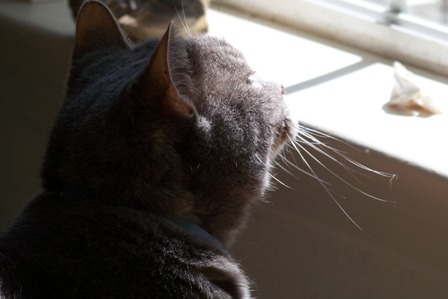In the woods outside my window, it seems like nothing will stop this growing of green and the flurry of flashy red cardinals as they prepare their nests with their olive brown mates, who blend beautifully with the firebush, sparkleberry, and mesh of the passionflower vine.
In spring, every day is endless.
I am not immune to all this wonder of squirrels munching on the tender leaves of a wax myrtle, a treat seemingly worth the trek from the hole in the leaning Live Oak across the longleaf pine and down the passionflower vine.
Frankly, it makes the human world pale in comparison but then, nature usually does.

Here at the Apartments in the Woods, we have replaced watching the murderer among us with having to deal with mandatory online rent payment. Checks are no longer accepted. Not amazingly, emotions run high as if life itself, again, was threatened.
Quite the welcome for a new manager who had been assured the online payment system for our 55+ community of 144 apartments was in effect, one of many untruths she will discover for truth is not always what it appears.
I don’t know the percentage of people who pay rent online but I imagine the majority of residents use the convenience, which was not true just a few years ago when the majority cohort was more like 75+ but no one lives forever. Nonetheless, their numbers are still sizable, including my 93-year-old neighbor, Sybil, who somehow still maintains her flip phone, despite threats from everywhere and everyone that it can’t be done.
Although we have been neighbors (sharing a common wall) for 11 years, and true friends for the last five, I often forget Sybil is Sicilian and have to be reminded, which she does with pride. Round faced with a slight rosacea on her high cheekbones, Sybil is a clear-eyed beauty with flowing white hair, agile yet fragile as her petite body begins to fail her.
Sybil is prone to one point of view on any subject (until she’s done with it), no matter the cost. She traces this to the island existence of her Sicilian ancestors who were faced with one invasion after another. Hers is a kind of reticence, which some have called stoicism, and with this visage, she faces all weathers.

Something like 30 or 40 years ago, Sybil decided the Internet was a passing phase and only last month did she admit that had “probably been a mistake.”
To their credit, Sybil’s family is proceeding at her pace, in their completion of the online payment process, relying on the information Sybil provides, such as the documentation sent out by Apartments in the Woods Enterprises (AWE) for the online payment portal.
AWE is to be commended for a streamlined and simple process. Residents who had never made any kind of online payment completed the process in about a quarter of an hour. It feels rather worldy, this being on the web, writing electronic checks for rent.
Sybil is not so sure, although some days she sees its truth, yet when it comes time for her son, Paul, to complete the process, Sybil lies awake at night worrying about hackers, for she is well read and has an amazingly accurate understanding of the World Wide Web for someone who has only looked upon but never browsed or received an email.
“It seems that there is still a problem with the rent,” Sybil tells me. “Paul is exhausted by all this.”
“There is no problem with the system, Sybil.” The words are out of my mouth before I can stop myself, clipped and cold. I’m tired of the conversation before it begins yet again, but I do better with “what’s the problem Paul is having.”
“There is no place to put the routing or account number,” Sybil pronounces this as fact. “I don’t want Apartments in the Woods to have access to my checking account.”
We have been having this conversation two or three times a day for the last two weeks, and I know where it’s going, but I also know Sybil vets her ideas with me before she shares them with her family, for reasons understood only by Sybil, but there is a lot of fear, too, always a tough subject, which is to say that I, too, sometimes get the wrong end of the stick.

“Sybil,” I say, wincing at my tone of voice, not quite terse but close. “If Paul enters your routing and account numbers into the AWE system—
“The WHAT?” Sybil begins to talk over me, thankful for the tangent. “I don’t even know—
“Sybil, stop. Just. Stop. Talking. Over. Me.” And finally, she does. “When you write a check for your rent, isn’t the routing number and the account number on the check? Yes or no.”
“Yes.”
“So, Paul is going to enter that same information into the online system. It’s an electronic check rather than a paper one. That’s it. Nothing more.”
“Okay. I’m fine with that. But we’re going to use a credit card.”
“You do you, Sybil, but know there will be at least a 3% charge for using your card. That’s about $30.”
“Paul says five or 10 dollars,” Sybil fires back.
“He’s wrong, just wrong.”
We are both so over this conversation, but we both know it’s not yet resolved. Sybil is upset at herself, not for the first time, for refusing to have any kind of online presence over all those years. So many missed moments, those, but I’ve made that kind of mistake, too. It hurts.
At 93, both Sybil and her family are doing everything they can to maintain her independence. Increasingly, that means more to do for them and less for her. They love her deeply and do not mind, and Sybil is grateful, but with each task, there is one more thing out of her control. It’s such an uneasy balance for all of them.
Somewhat similarly, my body is far older than my almost 69 years, and I am ever adapting to maintain my independence. So, Sybil and I are each at an age where decisions close a door and not always does another window open.
My heart is a bit sad that my tone of voice has been firm with Sybil—well, terse at times, if I am honest—Sybil, too, is a bit sad that she can’t write a check to pay her rent as she has always done for the last 17 years. For her generation, loyalty and consistency were just about everything in life. I get it.
As usual, I turn to Pema Chödrön to see if I can find something in her words for my frustration. I don’t want to repress it or reject it. I want to go to its core to see what I can learn from it and maybe help Sybil look at hers. In other times, Sybil has done it for me, in her own way, which is not mine.
Turns out Pema has a friend who talks about this very thing.
“As a way of working with our aggressive tendencies, Dzigar Kongtrül teaches the nonviolent practice of simmering. He says that rather than ‘boil in our aggression like a piece of meat cooking in a soup we simmer in it.’”
Pema Chödrön
Not exactly the imagery I was seeking but I get the metaphor.
“We allow ourselves to wait, to sit patiently with the urge to act or speak in our usual ways and feel the full force of that urge without turning away or giving in.”
Pema Chödrön
I am aware of the energy in “edginess,” or what Pema Chödrön refers to as “groundlessness,” and I find it attractive, that unknown. How to manage when I don’t have my feet on the ground, when what I know is not of worth to someone else or is not what they can yet receive, and I must be patient and listen in acceptance.
“Neither repressing nor rejecting, we stay in the middle, between the two extremes, in the middle between yes and no, right and wrong, true and false.”
Pema Chödrön
Most of my life I was a “fixer,” offering the obvious solution only to have it rejected because the choice was not mine to make. Not everyone comes to change the same way or at the same pace. Patience in every moment—to sit and simmer—although easier with age, it is no guarantee.
There is only one solution for Sybil no matter how many times we talk through what must happen. What is not an issue for me is a game changer for her but we offer what we have to one another, although it doesn’t feel like it’s what we need. I don’t hear anything about online rent payment until the fifth of the month, the last day before rent is late.
“I was going to have to pay almost $28 if I used my credit card!” Sybil has never been a stranger to umbrage.
“So, Paul found where to enter the routing and account numbers?” I just have to know, which feels a bit unfair but somehow, it feels important. “He received a receipt by email, correct?”
“Well, if you can call it a receipt. It says, ‘Dear Sybil’ and then gives only my apartment number without which building. There are at least four different apartments with the same last three numbers.”
We talk about unique transaction numbers for a while, which is what is important for a transaction to take place between the two systems.
“But that’s just it. It hasn’t cleared my bank. There is no transaction.”

“Sybil, we just went through the receipt, line by line. You have a transaction number. The receipt says it was sent. That specific transaction was sent.”
“The bank has not received it. I’m going to be late on my rent.”
“You are not going to be late on your rent because you have a receipt saying you paid it on the 29th.”
“But there is no transaction is what the bank is saying,” Sybil says, with a calm that is surprising.
That is a problem but there also seems to be a solution or maybe she’s been winding me up. I can’t say I might not do the same.
“Paul is working with the AWE manager.” Sybil pauses, pleased with her use of the acronym, and I find myself smiling. She goes on, “The account number was wrong.”
“Did Paul enter it incorrectly?”
“No!” Sybil snaps. Her son does not make mistakes. “I didn’t give him the zero.”
“The what??!!” And for a moment I am as lost, if not moreso, than Sybil was when all this started.
“The zero in front of my account number on my check. I never use it. When I was in school, we were always told that zero isn’t a number. It’s nothing.”
“Let me put it this way, Sybil. Data is made up of nothing but ones and zeros.” I pause before adding, “that’s just probably adding to the confusion.”
“No, it’s not! I understand that. I’m saying that when I was in school zero wasn’t a number.”
“Zero is a number and it has value, Sybil. It may look empty but it’s anything but nothing.” We wait for a moment before I ask, “Didn’t you give Paul a voided check so he could enter the numbers?”
“Yes, but he said he didn’t need it because I read the numbers to him.”
“So, Paul had a check but he entered the numbers you read to him.
“Correct.”
“But he has now entered the correct account number into the system????”
“I don’t know.”
This time I don’t go there. I look at the woods outside my window and tell Sybil I watched a goldfinch singing this very morning, sitting atop a still bare branch of the fire bush, yet another add to my birding life list.
And Sybil who has taught me so much about the flora and fauna that is the woods outside my window begins to tell me yet another story about spring in some year before the Internet, when you could believe zero was not a number and not be bothered at all.

*Pema Chodron excerpts from Living Beautifully with Uncertainty and Change, page 49.





































